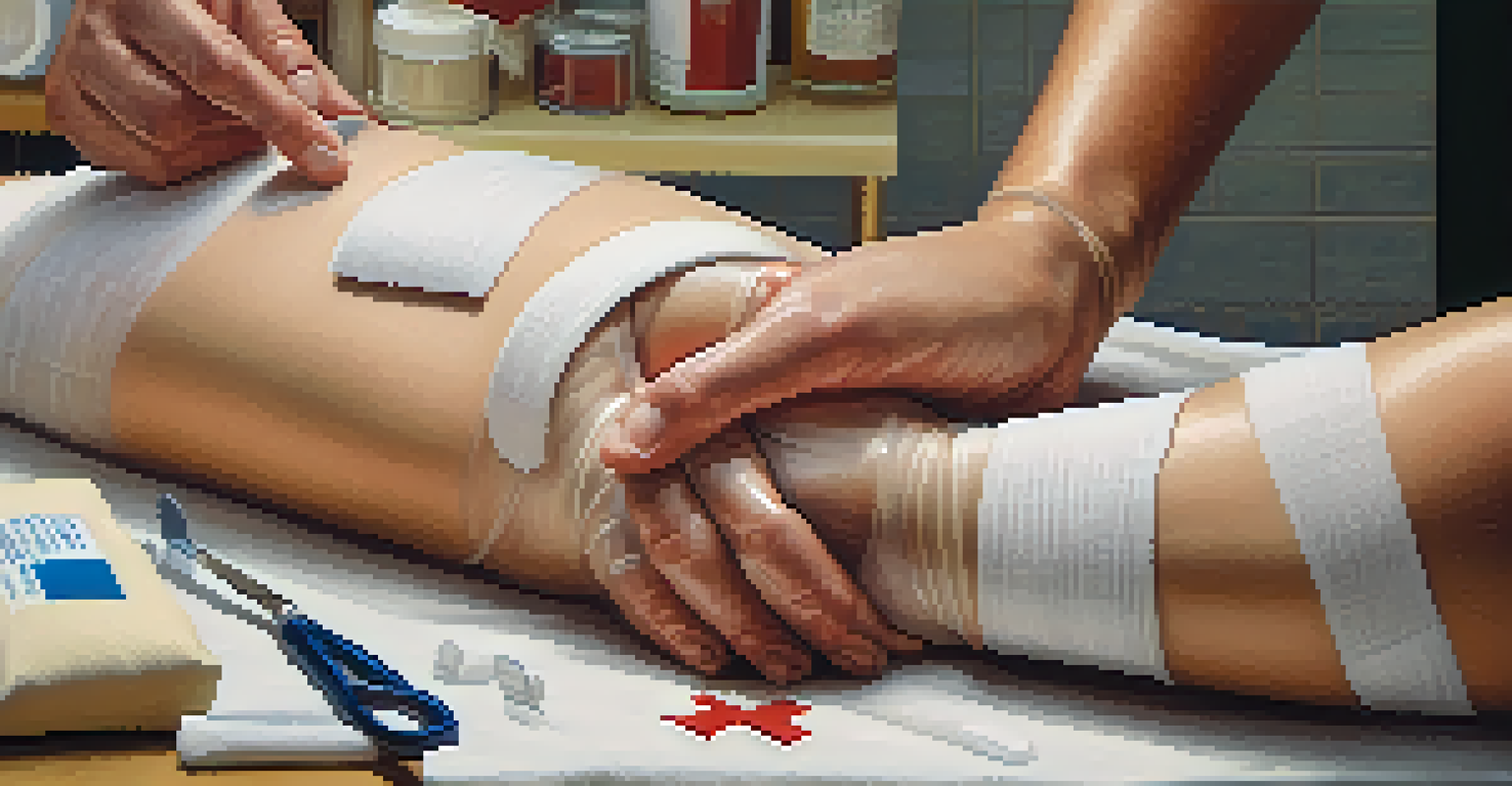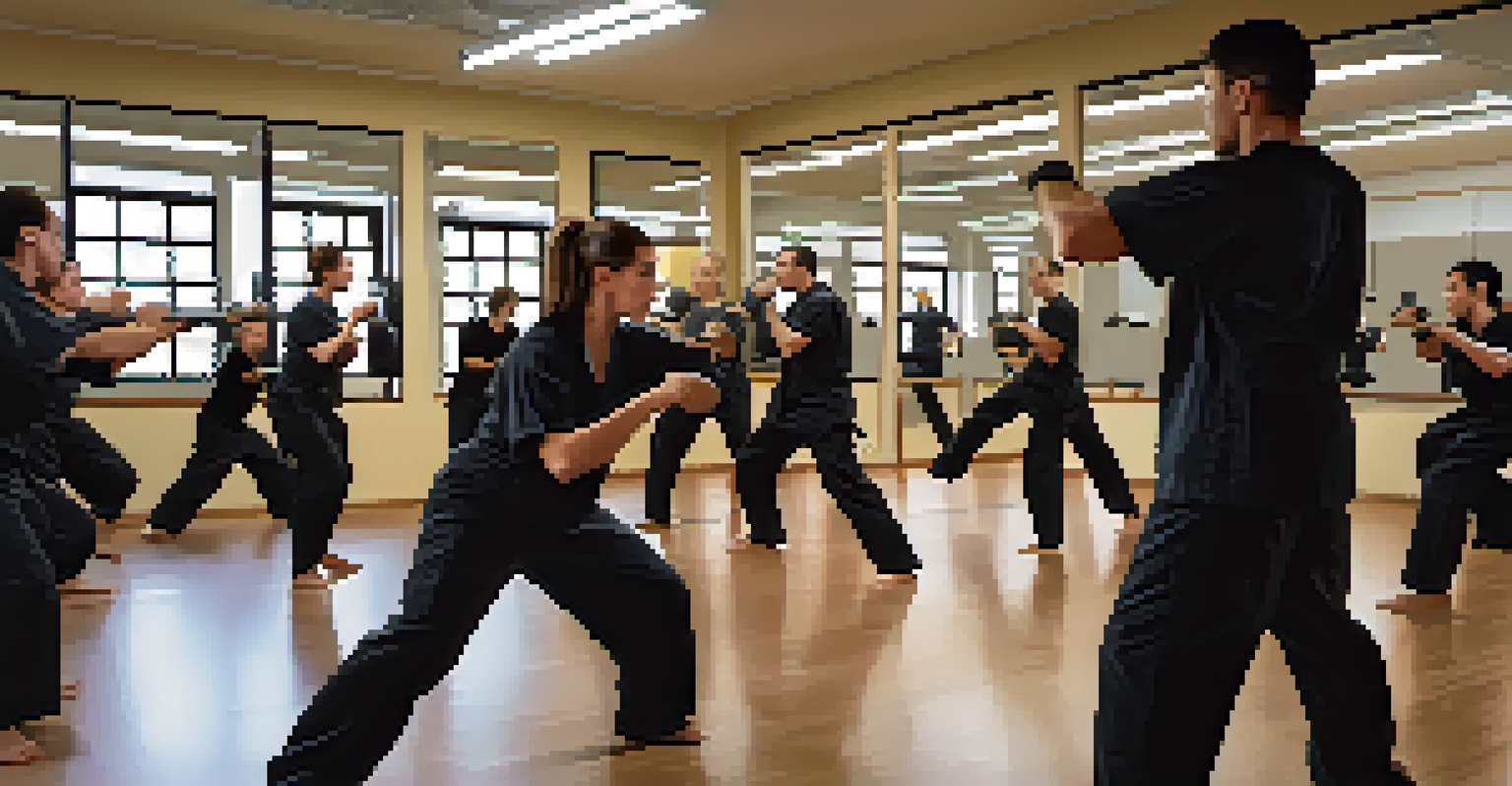How Self Defense Training Prepares You for Medical Emergencies

Understanding the Connection Between Self Defense and Medical Emergencies
Self-defense training often emphasizes quick thinking and adaptability, skills that are equally vital in medical emergencies. Just as you learn to assess threats in self-defense, you also learn to recognize critical situations that require immediate action. This mindset prepares you to stay calm and focused when faced with a medical crisis, whether it's a sudden injury or a more complex issue.
In the midst of chaos, there is also opportunity.
In both scenarios, the ability to make split-second decisions can make all the difference. For example, a self-defense instructor may teach you to evaluate your surroundings quickly, a skill that translates directly to assessing a person's condition during an emergency. This overlap highlights how self-defense is not just about physical protection but also about mental preparedness.
Moreover, the discipline required in self-defense training fosters a sense of responsibility. This mentality encourages individuals to take action, not just for their safety but also for others, reinforcing the importance of being proactive in emergencies.
Developing Situational Awareness through Self Defense
Situational awareness is a core component of self-defense training, focusing on understanding your environment and potential threats. This heightened awareness is crucial in medical emergencies, where recognizing signs of distress can be life-saving. For instance, noticing someone clutching their chest may prompt you to act swiftly, whether by calling for help or administering basic first aid.

Training in self-defense teaches you to observe body language and cues, which can be directly applied to assessing a person's health. By tuning into the small details, you become more adept at identifying emergencies that others might overlook. This skill not only helps in self-defense scenarios but also in everyday life when someone around you may need assistance.
Self-Defense Enhances Medical Readiness
Self-defense training cultivates quick thinking and adaptability, skills that are crucial in responding to medical emergencies.
Additionally, situational awareness helps you remain composed under pressure. Just as you learn to scan your environment for threats, you also learn to filter out distractions during a medical crisis, allowing you to focus on what truly matters: helping the person in need.
The Importance of Quick Decision-Making Skills
Self-defense training often involves split-second decision-making, which is invaluable during medical emergencies. In self-defense, you must quickly determine the best course of action to protect yourself; similarly, in a medical situation, you may need to decide whether to perform CPR or call 911 first. This ability to assess and act swiftly can be critical in saving lives.
The best way to predict the future is to create it.
Training sessions often simulate high-pressure situations, forcing participants to practice their decision-making skills in real-time. For instance, during a self-defense drill, you might practice responding to an unexpected attack, which mirrors the unpredictability of medical emergencies. This practice builds confidence, allowing you to trust your instincts when it matters most.
Moreover, the experience of making quick decisions in self-defense builds resilience. You learn that while not every choice will be perfect, taking action is better than hesitation, a lesson that is equally applicable when facing medical challenges.
Building Confidence to Handle Emergencies
One of the most significant benefits of self-defense training is the confidence it instills in individuals. This newfound confidence can be a game-changer during medical emergencies, where fear and uncertainty can lead to inaction. When you’ve practiced defending yourself, you’re more likely to trust your abilities to assist others in distress as well.
Training not only equips you with physical skills but also reinforces a belief in your capacity to make a difference. This shift in mindset can empower you to take charge in an emergency, whether that means providing first aid or guiding others to safety. For example, if you're trained to handle confrontational situations, you may feel equally capable of guiding a panicking person through a medical episode.
Situational Awareness is Key
Developing situational awareness in self-defense helps individuals recognize signs of distress, potentially saving lives during medical crises.
Additionally, the community aspect of self-defense classes fosters a supportive environment. Sharing experiences with fellow trainees can bolster your confidence, as you realize that others face similar fears. This camaraderie can be invaluable in emergencies, reminding you that you’re not alone in your efforts to help.
Learning First Aid Techniques Alongside Self Defense
Many self-defense programs incorporate basic first aid training, teaching participants essential skills that can be critical in emergencies. Knowing how to address injuries or manage shock can complement your self-defense skills beautifully. For instance, if someone sustains a cut during a confrontation, your ability to provide immediate care can prevent further complications.
First aid training often includes practical applications, such as how to assess injuries and apply bandages. This hands-on experience reinforces the importance of acting quickly, whether in a self-defense scenario or a medical crisis. The confidence gained from knowing basic first aid can also encourage you to take action in situations where others might hesitate.
Moreover, understanding first aid principles can demystify medical emergencies. Just as you learn self-defense techniques through practice, repeating first aid drills helps solidify your knowledge, making you more prepared to handle real-life situations. This dual training approach creates a well-rounded skill set beneficial in many circumstances.
Enhancing Emotional Resilience through Training
Self-defense training not only builds physical skills but also enhances emotional resilience, which is crucial in medical emergencies. The challenges faced during training—such as confronting fears or overcoming physical limitations—prepare you for the unpredictable nature of emergencies. This resilience can help you maintain a level head when adrenaline kicks in during a crisis.
For example, when practicing self-defense techniques, you might experience moments of doubt or panic. Learning to push through these feelings can translate to medical situations, where staying calm is vital. By training your emotional response, you become better equipped to support others when they need it the most.
Confidence Boosts Emergency Response
The confidence gained from self-defense training empowers individuals to take decisive action in emergencies, benefiting both themselves and others.
Furthermore, the ability to manage stress and anxiety during training can carry over into your everyday life. This emotional fortitude allows you to respond to medical emergencies with a clear mind, increasing your effectiveness in providing help. Ultimately, self-defense training cultivates not just physical strength but also mental toughness.
Creating a Support Network through Self Defense Classes
Participating in self-defense classes often leads to forming strong bonds with fellow trainees, creating a supportive network. This camaraderie can be beneficial in emergencies, as you may find yourself surrounded by individuals who share your skills and knowledge. In a medical situation, having others around you can provide additional support and resources.
These connections foster a sense of community, where members feel empowered to help one another. For example, if someone in your network has medical training, their presence can enhance the overall response to a crisis. This collaboration highlights the importance of teamwork in both self-defense and emergency situations.

Additionally, by training together, you create a shared understanding of the challenges and fears involved in both self-defense and medical emergencies. This mutual support can encourage you to take action when needed, as you know you’re part of a team. Building a strong network can ultimately lead to more effective responses in times of need.